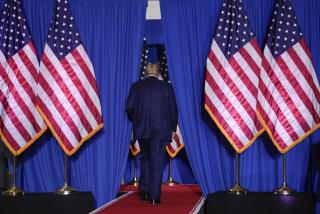The Truth About Lies: Most Can’t Detect Them : Psychology: Even most professional protectors of propriety have little success in spotting deceit, researchers say.
- Share via
When your son is watching television and says that he has finished his homework, can you be sure he’s not lying? When your wife comes home late and says that she was out with the girls, do you know if she is stretching the truth?
No? Well, don’t feel bad. Most people can’t tell when someone is lying to them, including the vast majority of professionals we pay to detect falsehoods.
A new study of lying being reported today in the journal American Psychologist found that agents of the FBI, the CIA and the National Security Agency--as well as judges, local police, federal polygraph operators, psychiatrists and laymen--performed no better at detecting lies than if they had guessed randomly.
The only group that performed better than chance was the U.S. Secret Service, whose agents are entrusted with guarding the President, and even they were right only about 75% of the time on average, the San Francisco researchers reported.
The key finding of the study was that those people who were successful at detecting lies went about the process in a different way from the rest. “They listed different and more varied behaviors, emphasizing nonverbal more than verbal clues,” said psychiatrist Paul Ekman of UC San Francisco.
Verbal clues used to identify lies included such things as answering questions too slowly, being evasive, talking too much and contradicting oneself. The more effective nonverbal tip-offs to a lie included strained voices, avoidance of eye contact, false smiles and body language.
Ekman, a highly honored scientist, has spent more than 30 years studying the psychology and physiology of lying and has written two books on the topic. He says that the results of his latest study can be used to teach people how to discern lies more effectively.
The ability to catch other people in lies could be useful not only to law enforcement officers, but to businessmen dealing with tough customers and to government leaders dealing with foreign adversaries in a time of crisis, Ekman said.
In fact, Ekman is already implementing his research, presenting the results in one-day workshops to police and government officials. The new findings resulted from tests administered to participants in such sessions.
For the study, Ekman and psychologist Maureen O’Sullivan of the University of San Francisco made a series of one-minute videotapes of medical students watching either nature films or gory films of emergency rooms and surgeries. In both cases, the students were told to respond to questions about their emotions as though they were watching the nature films.
To help persuade the students to lie convincingly, they were told that the ability to suppress their emotions about the gory films was crucial to the progress of their medical careers.
The deception was necessary, Ekman said, because he had previously found that behavioral traits indicating lies were normally revealed only in “lies about very strong emotions, where the stakes are very high.
“Our findings pertain not to the trivial, everyday lie you might tell a telephone salesman, but to a lie where marriage, job or a friendship might be at stake,” Ekman said.
To conduct the study, workshop participants were shown tapes of five truthful interviews with the medical students and five interviews where the medical students lied. Each participant was asked to determine which students were lying, and to describe how they made their selections.
The vast majority of the 509 people who took the test averaged no better than five correct answers, the number that would be expected by chance. Only Secret Service agents did better. More than half of the agents got seven right, and more than a third got eight right. The poorest results were obtained by judges, psychiatrists and, worst of all, college students.
Among all groups, the people most accurate at lie detecting said they relied strongly on nonverbal clues. The speech clues were listed most often by those who proved not as good at catching the lies, Ekman said.
Why did the Secret Service outperform the other groups? Ekman speculates that it is because they spend a great deal of time guarding government officials from attacks. Scanning crowds for danger and similar surveillance work may force reliance on nonverbal clues, and that experience may result in greater attention to nonverbal behavior, he said.
The Big Lie
There is no foolproof method for detecting lies yet, but psychologist Paul Ekman offers some signs that indicate a person is lying.
* Hesitation in answering a question that should elicit an immediate response. Signs include looking away, pausing between sentences, repetitious speech and lack of animation in the face and body.
* Tightening the lips. People trying to hide anger often unknowingly make their lips narrower and tighter.
* Micro-expressions--fleeting facial expressions, usually lasting no more than a fraction of a second, that betray what a person actually thinks.
* A smile that doesn’t use any of the muscles around the eyes.
* A look of sadness that doesn’t show expression in the forehead.
* Facial expressions that last too long, more than about 10 seconds.






